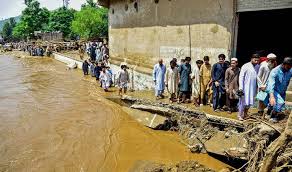Heavy rains have made life more difficult in the flood-hit areas of Khyber Pakhtunkhwa and the northern regions of Pakistan. The downpours have damaged more houses and forced many families to leave their homes.
Rescue teams confirmed that over 200 people had to be evacuated after a glacier burst in Gilgit-Baltistan, which blocked the Ghizer River and created dangerous conditions for nearby villages.
During a visit to Buner, Prime Minister Shehbaz Sharif expressed deep concern over the tragedy. He said that more than 350 people have lost their lives in Khyber Pakhtunkhwa alone, while the death toll across the country has crossed 700.
The Prime Minister stressed that the government must stop construction in areas at risk of floods. He also highlighted the urgent need for long-term disaster planning, such as reforestation and better land management, to reduce future risks.
In the middle of this crisis, local communities and welfare organizations have stepped forward to help the affected people.
They are providing food, temporary shelter, and basic supplies to families who have lost everything. Volunteers and local groups are working around the clock, showing solidarity in these difficult times.
Experts warn that Pakistan is extremely vulnerable to climate change and natural disasters. With a high number of glaciers and weak urban planning, especially in large cities like Karachi, the country faces increasing challenges from floods, glacial melts, and unpredictable weather patterns.
They emphasize that without serious measures, such disasters will continue to harm both rural and urban areas in the years to come.


